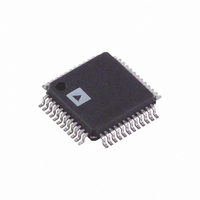AD9772AASTZ Analog Devices Inc, AD9772AASTZ Datasheet - Page 30

AD9772AASTZ
Manufacturer Part Number
AD9772AASTZ
Description
IC DAC 14BIT 160MSPS 48-LQFP
Manufacturer
Analog Devices Inc
Series
TxDAC+®r
Datasheet
1.AD9772AASTZ.pdf
(40 pages)
Specifications of AD9772AASTZ
Data Interface
Parallel
Settling Time
11ns
Number Of Bits
14
Number Of Converters
1
Voltage Supply Source
Analog and Digital
Power Dissipation (max)
272mW
Operating Temperature
-40°C ~ 85°C
Mounting Type
Surface Mount
Package / Case
48-LQFP
Resolution (bits)
14bit
Sampling Rate
160MSPS
Input Channel Type
Parallel
Supply Voltage Range - Analog
3.1V To 3.5V
Supply Current
37mA
Digital Ic Case Style
QFP
Lead Free Status / RoHS Status
Lead free / RoHS Compliant
For Use With
AD9772A-EB - BOARD EVAL FOR AD9772A
Lead Free Status / RoHS Status
Lead free / RoHS Compliant, Lead free / RoHS Compliant
Available stocks
Company
Part Number
Manufacturer
Quantity
Price
Company:
Part Number:
AD9772AASTZ
Manufacturer:
TI
Quantity:
1 756
Company:
Part Number:
AD9772AASTZ
Manufacturer:
Analog Devices Inc
Quantity:
10 000
Part Number:
AD9772AASTZ
Manufacturer:
ADI/亚德诺
Quantity:
20 000
Company:
Part Number:
AD9772AASTZRL
Manufacturer:
Analog Devices Inc
Quantity:
10 000
Part Number:
AD9772AASTZRL
Manufacturer:
ADI/亚德诺
Quantity:
20 000
AD9772A
BASEBAND SINGLE-CARRIER APPLICATIONS
The AD9772A is also well suited for wideband single-carrier
applications, such as WCDMA and multilevel quadrature
amplitude modulation (QAM), whose modulation scheme
requires wide dynamic range from the reconstruction DAC to
achieve the out-of-band spectral mask as well as the in-band
CNR performance. Many of these applications strategically
place the carrier frequency at one quarter of the DAC’s input
data rate (that is, f
design. Because this constitutes the first fixed IF frequency, the
frequency tuning is accomplished at a later IF stage. To enhance
the modulation accuracy and reduce the shape factor of the
second IF SAW filter, many applications specify that the pass
band of the IF SAW filter be greater than the channel
bandwidth; however, the trade-off is that this requires that the
TxDAC meet the spectral mask requirements of the application
within the extended pass band of the second IF, which may
include two or more adjacent channels.
Figure 56 shows a spectral plot of the AD9772A reconstructing a
test vector similar to those encountered in WCDMA applications.
However, WCDMA applications prescribe a root raised cosine
filter with an alpha = 0.22, which limits the theoretical ACPR of
the TxDAC to about 70 dB, whereas the test vector represents
white noise that has been band-limited by a brick wall band-
pass filter with a pass band for which the maximum ACPR
performance is theoretically 83 dB and the peak-to-rms ratio
is 12.4 dB. As Figure 56 reveals, the AD9772A is capable of
approximately 78 dB ACPR performance when one accounts for
the additive noise/distortion contributed by the Rohde & Schwarz
FSEA30 spectrum analyzer.
DIRECT IF
As discussed in the Digital Modes of Operation section, the
AD9772A can be configured to transform digital data representing
baseband signals into IF signals appearing at odd multiples of
the input data rate (that is, N × f
This is accomplished by configuring the MOD1 and MOD0 digital
inputs high. Note that the maximum DAC update rate of 400 MSPS
limits the data input rate in this mode to 100 MSPS when the
Figure 56. AD9772A Achieves 78 dB ACPR Performance Reconstructing a
WCDMA-Like Test Vector with f
–100
–110
–120
–130
–30
–40
–50
–60
–70
–80
–90
CENTER 16.25MHz
C11
DATA
/4) to simplify the digital modulator
C11
C0
DATA
600kHz
DATA
= 65.536 MSPS and PLLVDD = 0
, where N = 1, 3, and so on).
C0
Cu1
SPAN 6MHz
Cu1
Rev. C | Page 30 of 40
zero-stuffing operation is enabled (that is, when MOD1 is high).
Applications requiring higher IFs (that is, 140 MHz) using
higher data rates should disable the zero-stuffing operation. In
addition, to minimize the effects of the PLL clock multipliers
phase noise as shown in Figure 31, an external low jitter/phase
noise clock source equal to 4 × f
Figure 57 shows the actual output spectrum of the AD9772A
reconstructing a 16-QAM test vector with a symbol rate of
5 MSPS. The particular test vector was centered at f
f
the pair of images appearing around f
because this pair has the flattest pass band and highest signal
power. Higher frequency images can also be used, but such
images will have reduced pass-band flatness, dynamic range,
and signal power, thus reducing the CNR and ACP performance.
Figure 58 shows a dual-tone SFDR amplitude sweep at the various
IF images with f
tones centered around f
assumed to precede the AD9772A, the SFDR was measured
over a 25 MHz window around the images occurring at 75 MHz,
125 MHz, 275 MHz, and 325 MHz.
DATA
Figure 58. Dual-Tone Windowed SFDR vs. A
= 100 MSPS and f
–100
–20
–30
–40
–50
–60
–70
–80
–90
Figure 57. Spectral Plot of 16-QAM Signal in Direct IF Mode at
70
65
50
90
85
80
75
60
55
–14
0
125MHz
275MHz
325MHz
–12
DATA
= 100 MSPS, f
100
75MHz
–10
DAC
DATA
f
DATA
= 400 MHz. For many applications,
FREQUENCY (MHz)
/4. Note that because an IF filter is
= 100 MSPS
A
–8
OUT
DATA
200
(dBFS)
DAC
–6
is recommended.
DATA
= 400 MHz, and the two
OUT
will be more attractive
–4
@ f
300
DATA
= 100 MSPS
–2
DATA
/4 with
400
0













